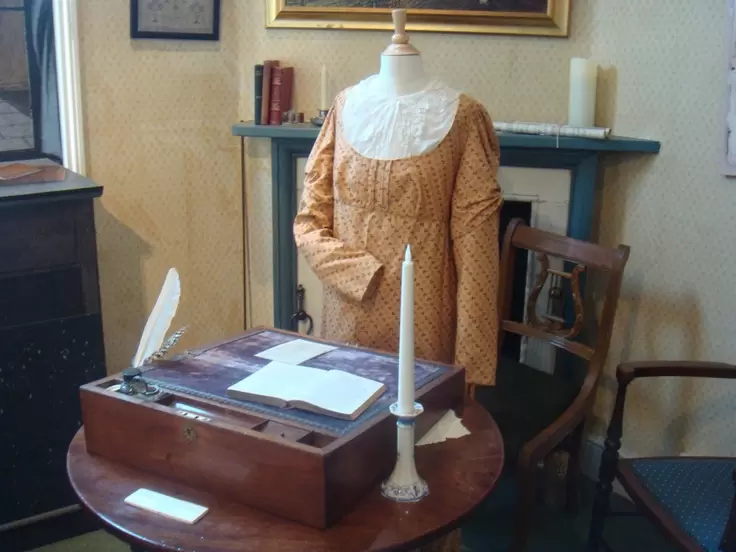Jane Austen is one of the most important writers of English literature. Austen, who lived in the late 18th and early 19th centuries, had a great impact on the literary world with her novels. Austen's works generally deal with the upper class of English society and their lifestyles. However, these works also address universal topics such as human relationships, love, marriage, and social norms. Austen's most famous works include "Pride and Prejudice", "Sense and Sensibility", and "Emma". The Jane Austen Centre serves as a resource for those who want to learn about the author's life and works. The center is located in Chawton, the writer's home, and provides visitors with information about Austen's life, works, and era.
Jane Austen's Life: From Childhood to Adulthood

Jane Austen is one of the most important writers in English literature. She was born on December 16, 1775 in Hampshire, England. Her father, George Austen, was a clergyman and her mother was Cassandra Leigh. Jane was the second of six siblings and they lived in a small town together.
During her childhood, Jane received education at home and developed herself by reading books from her family's library. At the age of eight in 1785, she began taking French lessons from a teacher. She also took music and dance lessons.
In 1795, Jane's father retired and their family moved to Bath. During this time, Jane's interest in writing increased and she began working on her first novel, "Sense and Sensibility". The novel was published in 1811 and achieved great success.
Jane met Tom Lefroy in 1802 and fell in love with him. However, their families opposed the relationship and did not allow them to marry. Jane never married for the rest of her life.
In 1816, Jane's health deteriorated and she became ill during a vacation in Lyme Regis. Her illness was likely Addison's disease and she died on July 18, 1817.
Jane Austen is considered one of the most important writers in English literature. Her novels address the class differences and difficulties faced by women in English society. Jane's works are still read and followed with love today.
Jane Austen's Works: Best Novels and Features

Jane Austen is one of the most important writers of English literature. Austen, who lived in the late 18th and early 19th centuries, is known for her novels about the upper class and family life. Her works reflect the social structure of the period and the difficulties women faced.
One of Austen's most famous novels is "Pride and Prejudice". The novel tells the love story of Elizabeth Bennet and Fitzwilliam Darcy. While addressing the lifestyle and family life of the upper class, the novel also reflects the difficulties women faced in society. One of the most important features of the novel is Austen's sense of humor. The novel satirizes the fake traditions of the upper class and people's attitudes towards each other.
Another important novel by Austen is "Sense and Sensibility". The novel tells the love stories of Elinor and Marianne, the two sisters of the Dashwood family. While addressing the lifestyle of the upper class, the novel also reflects the difficulties women faced in society. One of the most important features of the novel is the depth and emotionality Austen gives to her characters. The novel tells about people's emotional worlds and the power of love.
Austen's other important novels include "Emma", "Mansfield Park" and "Northanger Abbey". These novels also address the lifestyle of the upper class while reflecting the difficulties women faced in society. Austen's works have an important place in literary history because they reflect the social structure of the period and the difficulties women faced.
The Influence of Jane Austen: Its Effects on Modern Literature and Feminism

Jane Austen is one of the most important writers of English literature. Austen, who lived in the late 18th and early 19th centuries, made a great contribution to the development of modern literature with her novels. She is also considered one of the pioneers of the feminist movement.
Austen's novels address the social structure of the period and reveal the difficulties women faced. Especially in a time when it was almost impossible for women to lead a life outside of marriage, Austen's heroines are determined to manage their own lives. Therefore, Austen's novels are considered one of the pioneers of the feminist movement.
Austen's influence is felt not only in literature but also in the world of cinema and television. Her novels have been adapted to film and television many times. These adaptations show that Austen's works are still of interest in the modern world.
Austen's influence has touched not only women's lives but also men's lives. Austen's male characters are different from traditional male roles. They are emotional and intelligent characters. Therefore, Austen's male characters show that men can also be emotional and intelligent.
In conclusion, Jane Austen's influence has been great on modern literature and the feminist movement. Her novels offer a critical perspective on women's lives and social structures, while her male characters show that men can be emotional and intelligent. Austen's works are still of interest today and are read by readers.
Jane Austen and Romanticism: An Examination on the Themes of Love and Marriage

Jane Austen is one of the most important writers of English literature. She is considered one of the most important representatives of 19th century English novels, especially focusing on love and marriage themes. These themes carry the influences of the Romanticism movement.
In Austen's works, love and marriage are combined with topics such as social class differences, women's status, and family values. Therefore, Austen's works can be read not only as a romantic love story but also as a social critique.
One of Austen's most famous works, "Pride and Prejudice," reflects love and marriage themes in the best way. The main character of the novel, Elizabeth Bennet, falls in love with a wealthy man named Mr. Darcy. However, Elizabeth's family and social class differences make it difficult for this love to come true. The novel deals with the power of love and the influence of social class differences.
Austen's other works also deal with similar themes. "Sense and Sensibility" tells the love and marriage adventures of two sisters, while "Emma" deals with a woman's desire to get married.
While Austen's works carry the influences of the Romanticism movement, they also make social critiques. Austen draws attention to women's social status and family values while also addressing love and marriage themes. Therefore, Austen's works can be read not only as a romantic love story but also as a social critique.
Jane Austen's Era: The Place and Importance of Women Writers in 18th Century England

In 18th century England, the place and importance of female writers became more prominent with Jane Austen's era. Austen was among only a few female writers at the time, and her works were often underestimated due to the limited roles and opportunities women had in society. However, despite being often underestimated due to the limited roles and opportunities women had in society, Austen's writings had a great impact because they addressed the difficulties and limitations of women's daily lives.

Comments